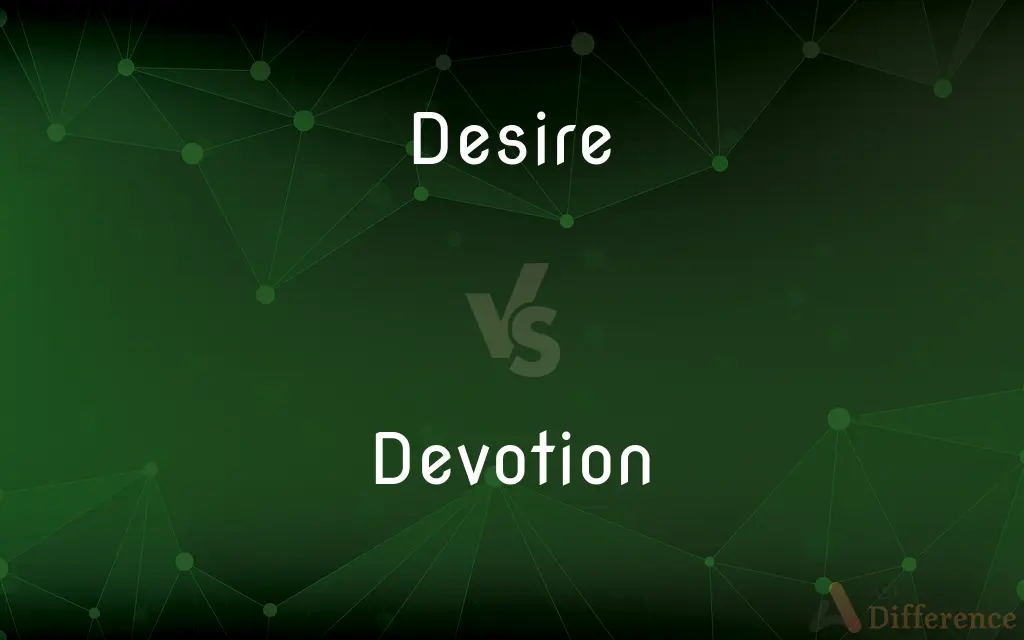Desire vs. Devotion — What's the Difference?
Edited by Tayyaba Rehman — By Maham Liaqat — Updated on May 2, 2024
Desire is a strong feeling of wanting something or someone, often fleeting and self-centered; devotion is a deep commitment, usually enduring and selfless.

Difference Between Desire and Devotion
Table of Contents
ADVERTISEMENT
Key Differences
Desire often manifests as a powerful urge or craving for something, such as success, pleasure, or a specific object. It is primarily driven by personal satisfaction and can vary in intensity and duration. On the other hand, devotion is characterized by a steadfast loyalty or deep affection towards a person, cause, or duty. It implies a more sustained and profound commitment that often involves sacrifice and selflessness.
While desires can be transient and change frequently, devotion tends to be more consistent and long-lasting. Desires may shift as one's interests or circumstances change, whereas devotion is marked by persistence and a strong sense of duty or love, often regardless of changing conditions.
Desire is typically centered on fulfilling one's own needs and wants, often without consideration for others. It can be self-serving and is sometimes associated with immediate gratification. Conversely, devotion is inherently other-focused, emphasizing the well-being or success of the object of one's devotion, whether it be a person, a deity, or a cause.
In the realm of relationships, desire might manifest as physical attraction or a desire for companionship, which can be intense but not necessarily enduring. Devotion in relationships, however, reflects a deeper level of commitment and care, prioritizing the other person’s needs and fostering a long-term bond.
The outcomes of desire and devotion can also differ significantly. While unfulfilled desires might lead to frustration or disillusionment, unshaken devotion often cultivates a sense of purpose and fulfillment, even in the face of challenges or lack of reciprocation.
ADVERTISEMENT
Comparison Chart
Focus
Self-centered
Other-focused
Duration
Often short-lived
Long-lasting
Nature
Emotional, often physical
Deep, often spiritual or emotional
Goal
Personal satisfaction
Welfare or success of another
Typical Manifestation
In wants and cravings
In loyalty and deep commitment
Compare with Definitions
Desire
A need or urge to do something.
He had a strong desire to travel the world.
Devotion
A state of being ardently dedicated and loyal.
The poet's devotion to his muse inspired countless works.
Desire
A strong feeling of wanting to have something or wishing for something to happen.
She felt a burning desire to start her own business.
Devotion
The act of being dedicated or committed to a task or purpose.
His devotion to his work often kept him at the office late into the night.
Desire
Physical attraction or lust toward another person.
His desire for her was obvious, but unreciprocated.
Devotion
Love, loyalty, or enthusiasm for a person, activity, or cause.
Her devotion to her family was evident in all her actions.
Desire
A craving for something satisfying, like food or drink.
She had a sudden desire for chocolate ice cream.
Devotion
Religious worship or observance.
His devotion to his faith could be seen in his daily rituals.
Desire
An ambition or a hope to achieve something.
His desire to become a doctor was inspired by his childhood doctor.
Devotion
An act of giving time, energy, or resources to something.
The teacher's devotion to her students' success made a significant impact on their lives.
Desire
Desires are states of mind that are expressed by terms like "wanting", "wishing", "longing" or "craving". A great variety of features is commonly associated with desires.
Devotion
Ardent, often selfless affection and dedication, as to a person or principle.
Desire
To wish or long for; want
A reporter who desires an interview.
A teen who desires to travel.
Devotion
Religious ardor or zeal; piety.
Desire
To express a wish for; request.
Devotion
Often devotions An act of religious observance or prayer, especially when private.
Desire
The feeling of wanting to have something or wishing that something will happen.
Devotion
A religious text presenting a prayer, frequently accompanied by an introductory scriptural passage and a homiletic gloss.
Desire
An instance of this feeling
She had a lifelong desire to visit China.
Devotion
The act of devoting or the state of being devoted
The devotion of resources to research.
Desire
An object of such feeling or passion
A quiet evening with you is my only desire.
Devotion
(uncountable) The act or state of devoting or being devoted.
Desire
(Archaic) A request or petition.
Devotion
(uncountable) Feeling of strong or fervent affection; dedication
Desire
To want; to wish for earnestly.
I desire to speak with you.
Devotion
(uncountable) Religious veneration, zeal, or piety.
Desire
To put a request to (someone); to entreat.
Devotion
A prayer often found in the plural
Desire
To express a wish for; to entreat; to request.
Devotion
Religious offerings; alms.
Desire
To require; to demand; to claim.
Devotion
The act of devoting; consecration.
Desire
To miss; to regret.
Devotion
The state of being devoted; addiction; eager inclination; strong attachment love or affection; zeal; especially, feelings toward God appropriately expressed by acts of worship; devoutness.
Genius animated by a fervent spirit of devotion.
Desire
(countable) Someone or something wished for.
It is my desire to speak with you.
You’re my heart’s desire.
Devotion
Act of devotedness or devoutness; manifestation of strong attachment; act of worship; prayer.
Desire
(uncountable) The feeling of desiring; an eager longing for something.
Too much desire can seriously affect one’s judgment.
Devotion
Disposal; power of disposal.
They are entirely at our devotion, and may be turned backward and forward, as we please.
Desire
(uncountable) Motivation. en
Devotion
A thing consecrated; an object of devotion.
Churches and altars, priests and all devotions,Tumbled together into rude chaos.
Desire
To long for; to wish for earnestly; to covet.
Neither shall any man desire thy land.
Ye desire your child to live.
Devotion
Feelings of ardent love;
Their devotion to each other was beautiful
Desire
To express a wish for; to entreat; to request.
Then she said, Did I desire a son of my lord?
Desire him to go in; trouble him no more.
Devotion
Commitment to some purpose;
The devotion of his time and wealth to science
Desire
To require; to demand; to claim.
A doleful case desires a doleful song.
Devotion
Religious zeal; willingness to serve God
Desire
To miss; to regret.
She shall be pleasant while she lives, and desired when she dies.
Devotion
(usually plural) religious observance or prayers (usually spoken silently);
He returned to his devotions
Desire
The natural longing that is excited by the enjoyment or the thought of any good, and impels to action or effort its continuance or possession; an eager wish to obtain or enjoy.
Unspeakable desire to see and know.
Desire
An expressed wish; a request; petition.
And slowly was my mother broughtTo yield consent to my desire.
Desire
Anything which is desired; an object of longing.
The Desire of all nations shall come.
Desire
Excessive or morbid longing; lust; appetite.
Desire
Grief; regret.
Desire
The feeling that accompanies an unsatisfied state
Desire
An inclination to want things;
A man of many desires
Desire
Something that is desired
Desire
Feel or have a desire for; want strongly;
I want to go home now
I want my own room
Desire
Expect and wish;
I trust you will behave better from now on
I hope she understands that she cannot expect a raise
Desire
Express a desire for
Common Curiosities
How does devotion affect relationships?
Devotion in relationships typically enhances trust, deepens emotional connections, and contributes to long-term stability and satisfaction.
Is devotion always positive?
While generally seen as positive, excessive devotion can sometimes lead to neglect of one’s own needs or unhealthy dependencies.
How can one cultivate devotion in a personal or professional context?
Devotion can be cultivated through consistent effort, dedication to values and goals, and fostering deep connections with the involved parties or activities.
What is the main difference between desire and devotion?
Desire is a strong want often centered on self-fulfillment, while devotion is a committed and often selfless dedication to someone or something.
Can desire be controlled?
While it's difficult to control feelings of desire, one can manage actions and decisions influenced by those desires through self-discipline and awareness.
Can desire lead to devotion?
Yes, initial desires can sometimes evolve into deeper devotion as emotional bonds strengthen and commitments deepen.
What role does desire play in motivation?
Desire is a key driver of motivation, providing the initial impulse to act toward achieving personal goals or satisfying needs.
Is devotion limited to religious contexts?
No, devotion can extend to people, causes, or activities, and is not limited to religious worship or practices.
Are there cultural differences in how desire and devotion are perceived?
Yes, cultural backgrounds can influence the understanding and expression of desire and devotion, reflecting varying societal values and norms.
How is devotion expressed in everyday life?
Devotion is expressed through consistent actions, sacrifice for others’ welfare, and prioritizing the needs of the devoted entity over personal gain.
What psychological factors influence desire?
Factors like personal needs, past experiences, emotional state, and societal influences can all impact the intensity and object of desires.
Can one feel both desire and devotion for the same object or person?
Yes, it's common to experience both emotions for the same object or person, especially in deep or complex relationships.
What is the role of desire in consumer behavior?
Desire significantly influences consumer behavior by driving purchasing decisions and brand loyalty based on emotional and material wants.
How do desire and devotion differ in terms of outcomes?
Desire often leads to immediate but short-lived satisfaction, whereas devotion can produce enduring fulfillment and a sense of purpose.
How do desire and devotion impact personal growth?
Desire can initiate personal growth by motivating actions toward goals, while devotion fosters resilience, ethical consistency, and deeper interpersonal connections.
Share Your Discovery

Previous Comparison
Fructification vs. Fruition
Next Comparison
Viel vs. VeilAuthor Spotlight
Written by
Maham LiaqatEdited by
Tayyaba RehmanTayyaba Rehman is a distinguished writer, currently serving as a primary contributor to askdifference.com. As a researcher in semantics and etymology, Tayyaba's passion for the complexity of languages and their distinctions has found a perfect home on the platform. Tayyaba delves into the intricacies of language, distinguishing between commonly confused words and phrases, thereby providing clarity for readers worldwide.
















































